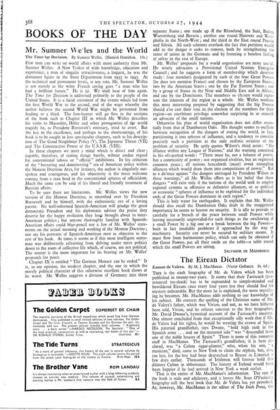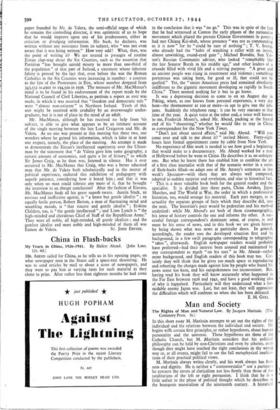The Eirean Dictator
Eamon de Valera. By M. J. MacManus. (Victor Gollancz. 8s. 6d.)
This is the sixth biography of Mr. de Valera which has been published in twenty-two years. It seems that their Taoiseach (pro- nounced tee-shack) has to be expounded to simple-minded and bewildered Eireans once every four years lest they should find his mystery unbearable. But the more he is explained, the more mystify- ing he becomes. Mr. MacManus adds nothing to our knowledge of his subject. He corrects the spelling of the Christian name of Mr. de Valera's father, which was Vivian, and not, as we have hitherto been told, Vivian, and he refuses sanction to the first biographer, Mr. David Dwane's, hysterical account of the Taoiseach's ancestry. One almost concluded from that exceptionally silly work that if Mr. de Valera had his rights, he would be wearing the crown of Spain. His paternal grandfather, says Dwane, "held high rank in the Spanish army . .. and on the maternal side" was "descended from one of the noble houses of Spain." There is none of this romantic stuff in MacManus. The Taoiseach's grandfather, it is here de- clared, was "a Cuban sugar-planter," who, when his son, "a musician," died, came to New York to claim the orphan, but, alas, too late, for the boy had been despatched to Bruree in Limerick 3 few days earlier. Thousands of Irishmen will forever hold this dilatory Cuban in abhorrence. The history of Ireland would have been happier if he had arrived in New York a week earliet. That is the entire of Mr. MacManus's information. The rest of the book is stale and adulatory, and it leaves Mr. Sean O'Faolain's biography still the best book that Mr. de Valera has yet provoked. As, however, Mr. MacManus is the editor a The Irish Press, the
paper founded by Mr. de Valera, the semi-official organ of which he remains the controlling director, it was optimistic of us to hope that he would improve upon any of his predecessors, either in criticism or divulging information. His book, he declares, was written without any assistance from its subject, who "was not even aware that it was being written." How very odd! What, then, was the point of writing it? We are treated to passages of routine Eirean clap-trap about the Six Counties, such as the assertion that Partition "has brought untold misery to more than one-third of the population" of that part of Ireland, a statement whose inherent falsity is proved by the fact that, even before the war the Roman Catholics in the Six Counties were increasing in number: a contrast to the fate of the Protestants in Eire whose -number dropped from 343,552 in .190! to 194,500 in 1936. The measure of Mr. MacManus's mind is to be found in his endorsement of the report made by the National Council of Civil Liberties, as partisan a report as ever was made, in which it was asserted that "freedom and democratic rule" were "almost non-existent" in Northern Ireland. Trash of this sort might be received with credulity by an overwrought under- graduate, but it is out of place in the mind of an adult.
Mr. MacManus, although he has received no help from his suhect, is able to give what appears to be an intimate account of the single meeting between the late Lord Craigavon and Mr. de Valera. As no one was present at this meeting but these two, one wonders where he gained his information, which is false in at least one respect, namely, the place of the meeting. An attempt is made to demonstrate the Eirean's intellectual superiority over the Ulster- man by the statement that "de Valera gave him some geography, a certain amount of economics, and quite a lot of history," to which Sir James Craig, as he then was, listened in silence. Has it ever occurred to Mr. MacManus that Craig, who was a better educated man that Mr. de Valera both scholastically and in the matter of political experience, endured this exhibition of pedagogery with superb patience, considering how it bored him ; and that it was only when no man could tolerate any more of it, that he brought the interview to an abrupt conclusion? After the fashion of Eireans, Mr. MacManus finds all his geese superb swans. Austin Stack, an envious and ineffective egotist, is "a brave but gentle idealist" ; an equally futile person, Robert Barton, a man of fluctuating mind and wambling moods, is "that sincere and gentle idealist " ; Erskine Childers, too, is "the gentle intellectual" ; and Liam Lynch is "the high-minded and chivalrous Chief of Staff of the Republican Army." They were all noble, all high-minded, all gentle idealists ; and the gentlest idealist and most noble and high-minded of them all was



























 Previous page
Previous page